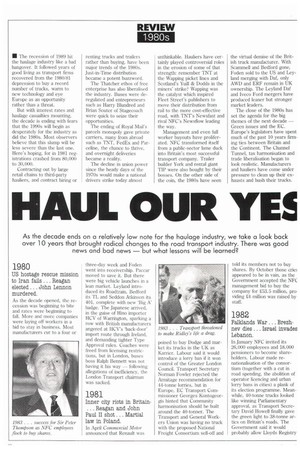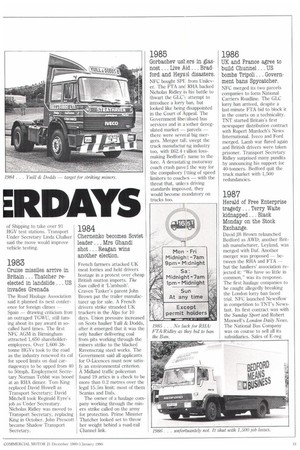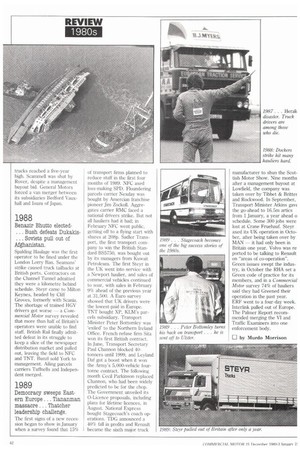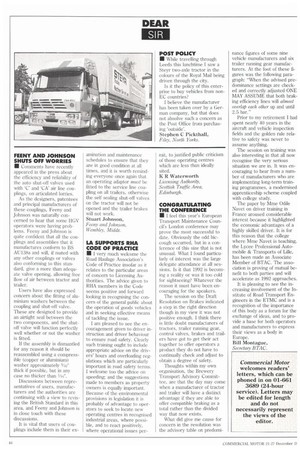HAUL OUR Y ERD
Page 42

Page 43

Page 44

Page 46

If you've noticed an error in this article please click here to report it so we can fix it.
1980
US hostage rescue mission to Iran fails ... Reagan elected ... John Lennon murdered.
As the decade opened, the recession was beginning to bite and rates were beginning to fall. More and more companies were laying off workers in a bid to stay in business. Most manufacturers cut to a four or three-day week and Foden went into receivership. Paccar moved to save it. But there were big vehicle launches in a lean market. Leyland introduced its Roadtrain, Bedford its TL and Seddon Atkinson its 401, complete with new 'Big A' badge. The Japanese arrived, in the guise of Hino importer HCV of Warrington, sparking a row with British manufacturers angered at I1CV's 'back-door' import route through Ireland, and demanding tighter Type Approval rules. Coaches were freed from licensing restrictions, but in London, buses boss Ralph Bennett was not having it his way following allegations of inefficiency, the London Transport chairman was sacked.
Inner city riots in Britain... Reagan and John. Paul II shot ... Martial law in Poland.
In April Commercial Maimannounced that Renault was
poised to buy Dodge and market its trucks in the UK as Karrier. Labour said it would introduce a lorry ban if it won control of the Greater London Council. Transport Secretary Norman Fowler rejected the Armitage recommendation for 44-tonne lorries, but in Europe, EC Transport Commissioner Georges Kontogeorgis hinted that Community harmonisation should be built around the 40-tonner. The Transport and General Workers Union was having no truck with the proposed National Freight Consortium sell-off and told its members not to buy shares. By October those crie; appeared to be in vain, as the Government accepted the NFC management bid to buy the company for 03.5 million, providing .£4 million was raised by staff.
nev dies Israel invades Lebanon.
In January NFC invited its 26,000 employees and 18,000 pensioners to become shareholders. Labour made renationalisation of the consortium (together with a cut in road spending, the abolition of operator licencing and urban lorry bans in cities) a plank of its election programme. Meanwhile, 40-tonne trucks looked like winning Parliamentary approval, as Transport Secretary David Howell finally gave the green light to 38-tonne artics on Britain's roads. The Government said it would probably allow Lloyds Registry of Shipping to take over 91 HGV test stations. Transport Under Secretary Linda Chalker said the move would improve vehicle testing.
Cruise missiles arrive in Britain ... Thatcher reelected in landslide ... US invades Grenada
The Road Haulage Association said it planned its next conference for foreign climes — Spain — drawing criticism Ironr an outraged TGWU, still fuming about its pay award in socalled hard times. The first NFC AGM in Birmingham attracted 1,650 shareholderemployees. Over 1,600 38tonne HGVs took to the road as the industry renewed its cal for speed limits on dual carriageways to be upped from 40 to 50mph. Employment Secretary Norman Tebbit was booed at an RHA dinner. Tom King replaced David Howell as Transport Secretary; David Mitchell took Reginald Eyre's job as Under Secreatary. Nicholas Ridley was moved to Transport Secretary, replacing King in October. John Prescott became Shadow Transport Secretary.
Chernenko becomes Soviet leader ... Mrs Ghandi shot ... Reagan wins another election.
French farmers attacked UK meat lorries and held drivers hostage in a protest over cheap British mutton imports. The Sun called it 'I:ambush'. Craven Tasker's parent John Brown put the trailer manufacturer up for sale. A French drivers strike stranded UK truckers in the Alps for 10 days. Union pressure increased on Scots haulier Yuill & Dodds, after it emerged that it was the only haulier delivering coal from pits working through the miners strike to the blacked Ravenscraig steel works. The Government said all applicants for 0-Licences must now satisfy an environmental criterion. A Midland traffic policeman found 19 artics in a check to be more than 0.2 metres over the legal 15.5m limit; most of them Scanias and Dais.
The owner of a haulage company working through the miners strike called on the army for protection. Prime Minister Thatcher looked set to throw her weight behind a road-rail Channel link.
Gorbachev ust.ers in glas
nost Live Aid ... Bradford and Heys31 disasters.
NFC bought SPI. from Unilever. The FTA and RHA backed Nicholas Ridley iii his battle to thwart the GLC'! attempt to introduce a lorry ban, but looked like being disappointed in the Court of Appeal. The Government liberalised bus services and in a iother deregulated market — parcels — there were sever al big mergers. Merger tall: swept the truck manufactur ng industry too, with £62.4 r ration lossmaking Bedford': name to the fore. A devastati ig motorway coach crash paved the way for the compulsory f tting of speed limiters to coaches — with the threat that, unIeE s driving standards improved, they would become mandatory on trucks too.
UK and France agree to build Chunnel . US bombs Tripoli ... Government bans Spycatcher.
NFC merged its two parcels companies to form National Carriers Roadline. The GLC lorry ban arrived, despite a last-minute PTA bid to block it in the courts on a technicality. TNT started Britain's first newspaper distribution contract with Rupert Murdoch's News International. Iveco and Ford merged. Lamb war flared again and British drivers were taken prisoner. Transport Secretary Ridley surprised many pundits by announcing his support for 40-tonners. Bedford quit the truck market with 1,500 redundancies.
Herald of Free Enterprise tragedy. . . Terry Waite kidnapped. . . Black Monday on the Stock Exchange.
David JB Brown relaunched Bedford as AWD; another British manufacturer, Leyland, was merged with Dd. Another merger was proposed — between the RHA and I■TA — but the hauliers' association rejected it: "We have so little in common," was its response. The first haulage companies to be caught allegedly breaking the London lorry ban faced trial. NFC launched Newsflow in competition to TNT's Newsfast. Its first contract was with the Sunday Sport and Robert Maxwell's London Daily News. The National Bus Company was on course to sell all its subsidiaries. Sales of E-reg trucks reached a five-year high. Scammell was shut by Rover, despite a management buyout bid. General Motors forced a van merger between its subsidiaries Bedford Vauxhall and Isuzu of Japan.
Benazir Bhutto elected... Bush defeats Dukakis... Soviets pull out of Afghanistan.
Spalding haulage was the first operator to be fined under the London Lorry Ban. Seamans' strike caused truck tailbacks at British ports. Contractors on the Channel Tunnel admitted they were a kilometre behind schedule. Steyr came to Milton Keynes, headed by Cliff Groves, formerly with Scania. The shortage of trained HGV drivers got worse — a Commercial Motor survey revealed that more than half of Britain's operators were unable to find staff. British Rail finally admitted defeat in its struggle to keep a slice of the newspaper distribution market and pulled out, leaving the field to NFC and TNT. Bunzl sold York to management. Ailing parcels carriers Tuffnells and Independent merged.
Democracy sweeps Eastern Europe ... Tiananman massacre ... Thatcher leadership challenge.
The first signs of a new recession began to show in January when a survey found that 15%
of transport firms planned to reduce staff in the first four months of 1989. NFC axed loss-making SPD. Floundering parcels carrier Nexday was bought by Amercian franchise pioneer Jim Zockoll. Aggregates carrier RMC faced a national drivers strike. But not all hauliers had it bad; in February NFC went public, getting off to a flying start with shares at 208p. Sadler Transport. the first transport company to win the British Standard 1355750, was bought out by its managers from Kuwait Petroleum. The first Steyr in the UK went into service with a Newport haulier, and sales of commercial vehicles continued to soar, with sales in February 9% ahead of the previous year at 31,500. A Euro survey showed that UK drivers were the lowest-paid in Europe. TNT bought XP, KLM's parcels subsidiary. Transport Minister Peter Bottomley was 'exiled' to the Northern Ireland Office. French refuse firm Sita won its first British contract. In June, Transport Secretary Paul Channon blocked 40tonners until 1999, and Leyland Daf got a boost when it won the Army's 5,000-vehicle fourtonne contract. The following month Cecil Parkinson replaced Channon, who had been widely predicted to be for the chop. The Government unveiled its 0-Licence proposals, including plans for lifetime licences, in August. National Express bought Stagecoach's coach operations. TUG announced a 40% fall in profits and Renault became the sixth major truck manufacturer to shun the Scottish Motor Show. Nine months after a management buyout at Lowfield, the company was taken over by Tibbet & Brittet and Rockwood. In September, Transport Minister Atkins gavt the go-ahead to 16.5m artics from 1 January, a year ahead o schedule. Some 300 jobs were lost at Crane Fruehauf. Steyr axed its UK operation in October, after being taken over by MAN — it had only been in Britain one year. Volvo was re ported to be talking to Renault on "areas of co-operation". Green issues swept the industry, in October the RHA set a Green code of practice for its members, and in a Commercial Motor survey 74% of hauliers said they had Greened their operation in the past year. ERF went to a four-day week. Interlink pulled out of Europe. The Palmer Report recommended merging the VI and Traffic Examiners into one enforcement body. FEENY AND JOHNSON SHUTS OFF WORRIES • Comments have recently appeared in the press about the efficiency and reliability of the auto shut-off valves used with 'C' and 'CA' air line couplings, on articulated lorries.
As the designers, patentees and principal manufacturers of these couplings, Feeny and Johnson was naturally concerned to hear that some MN" operators were having problems. Feeny and Johnson is quite confident that all the couplings and assemblies that it manufactures conform to BS AU138a and will, if mated with any other couplings or valves also conforming to this standard, give a more than adequate valve opening, allowing free flow of air between tractor and trailer.
Users have also expressed concern about the fitting of aluminium washers between the coupling and shut-off valve. These are designed to provide an airtight seal between the two components, and the shutoff valve will function perfectly well whether or not the washer is fitted.
If the assembly is dismantled for any reason it should be reassembled using a compressible (copper or aluminium) washer approximately 1/22" thick if possible. but in any case no thicker than vie.
Discussions between representatives of users, manufacturers and the authorities are continuing with a view to revising the British Standard in this area, and Feeny and Johnson is in close touch with these discussions.
It is vital that users of couplings include them in their ex amination and maintenance schedules to ensure that they are in good condition at all times, and it is worth reminding everyone once again that an operating adaptor must be fitted to the service line coupling on all trailers, otherwise the self sealing shut-off valves on the tractor will not he opened and the trailer brakes will not work.
Stuart Johnson, Feenv and Johnson, Wembley, Middx.
LA SUPPORTS RNA CODE OF PRACTICE • I very much welcome the Road Haulage Association's Code of Practice insofar as it relates to the particular areas of concern to Licensing Authorities, The advice given to RHA members in the Code seems positive and forward looking in recognising the concern of the general public about the operation of goods vehicles and in seeking effective means of tackling the issue.
I am pleased to see the encouragement given to driver instruction and driver behaviour to ensure road safety. Clearly such training ought to include appropriate advice on the drivers' hours and overloading regulations which are particularly important in road safety terms. 1 welcome too the advice on speeding; and the suggestions made to members as property owners is equally important. Because of the environmental provisions in legislation it is probably of advantage to operators to seek to locate new operating centres in recognised industrial areas, where possible, and to react positively, where operational issues per • While travelling through Leeds this lunchtime I saw a Steyr two-axle tractor in the colours of the Royal Mail being driven through the city.
Is it the policy of this enterprise to buy vehicles from nonEC countries?
1 believe the manufacturer has been taken over by a German company, but that does not absolve such a concern as the Post Office from purchasing 'outside'.
Stephen C Pickthall, Filey, North Yorks.
CONGRATULATING THE CONFERENCE
• I feel this year's European Transport Maintenance Council's London conference may prove the most successful to date. Obviously the odd hiccough occurred, but in a conference of this size that is not unusual. What 1 found particularly of interest was the large delegate attendance at all sessions. Is it that 1992 is becoming a reality or was it too cold for sightseeing? Whatever the reason it must have been encouraging for the speakers.
The session on the Draft Resolution on Brakes indicated a step in the right direction though in my view it was not positive enough. I think there is little doubt manufacturers of tractors, trailer running gear, control valves, brakes and trailers have got to get their act together to offer operators a product they do not have to continually check and adjust to obtain a degree of safety.
Thoughts within my own organisation, the Brewery Transport Advisory Committee, are that the day may come when a manufacturer of tractor and trailer will have a distinct advantage if they are able to offer compatible braking as a total rather than the divided way that now exists.
What did give me cause for concern in the resolution was the advisory table on predomi
nance figures of some nine vehicle manufacturers and six trailer running gear manufacturers. At the foot of these figures was the following paragraph: "When the advised predominance settings are checked and correctly adjusted ONE MAY ASSUME that both braking efficiency lines will almost overlap each other up and until 2.5 bar."
Prior to my retirement 1 had spent nearly 40 years in the aircraft and vehicle inspection fields and the golden rule relative to safety was never to assume anything.
The session on training was also interesting in that all now recognise the very serious situation we are in. It was encouragjng to hear from a number of manufacturers who are implementing long-term training programmes, a modernised apprenticeship scheme coupled with college study.
The paper by Mme Odile Navet on driver training in France aroused considerable interest because it highlighted the economic advantages of a highly skilled driver. It is for this reason that the college where Mme Navet is teaching, the Lycee Professional Automobile & Transports of Lille, has been made an Associate Member of BTAC. The association is proving of mutual benefit to both parties and will accelerate as 1992 approaches.
It is pleasing to see the increasing involvement of the Institute of Road Transport Engineers in the ETMC and is a recognition of the importance of this body as a forum for the exchange of ideas, and to provide a base for both operators and manufacturers to express their views as a body in Europe.
Bill Montague, Secretary BTAG,
















































































